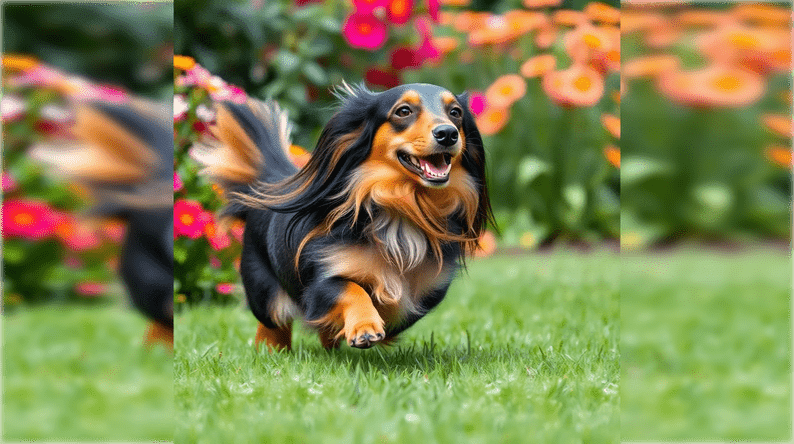Introduction
If you’re considering adopting a long-haired dachshund, it’s important to understand the temperament and care needs of this dachshund breed. Known for their curious nature, courageous spirit, and distinct long coats, these dogs make great companion animals but aren’t the right choice for everyone. While their bark can be loud and frequent, a dachshund can be an excellent watchdog, making them perfect for people who don’t mind a vocal dog. Keep in mind that they are hunting dogs at heart, originally bred to track small animals like badgers in badger dens. Their independent nature means they can be a bit stubborn, so a schedule for grooming needs and training is crucial to ensure a well-behaved dog.
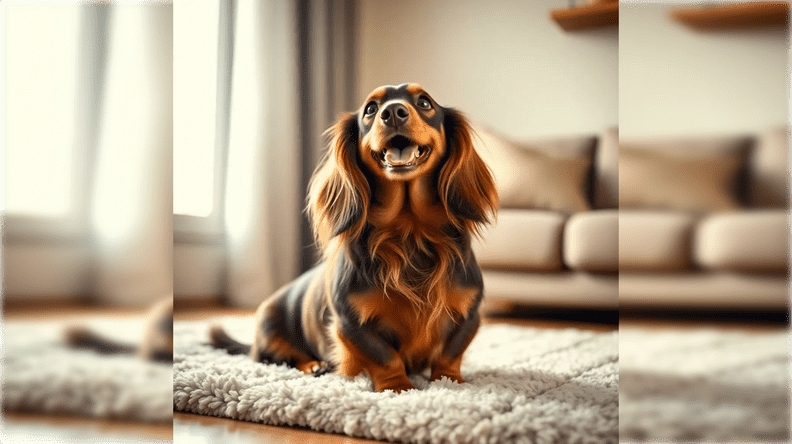
Though they might not be ideal for families with young children or living in an apartment, long-haired dachshunds can fit perfectly into a home with the right care. They are good with small animals and make wonderful pets for those who enjoy a strong bond with their pet. If you’re new to dog ownership or unsure about training, many questions can be answered through resources like a free dog training consult. Whether you’re preparing for a sausage dog or a wiener dog, this extensive guide will help you understand what it takes to keep your doxie happy and healthy. Be ready to put in the time, especially for their grooming needs, as maintaining their long coat requires regular care.
What Is the History of Long-Haired Dachshunds?
The dachshund is a breed that dates back to Germany in the 15th century, where they were originally bred for hunting badgers. The name dachshund comes from a German word that means “badger dog,” and these small but courageous dogs were designed to dig into badger dens with their keen sense of smell and determination. Over time, the breed evolved to have different coat types, including short, wiry, and long, with the long-haired dachshund becoming a popular variation. The long-haired coat was especially useful for hunting in different climates and terrains, as it provided extra protection in harsher conditions.
While the dachshund was primarily a hunting dog, over the years, they became more popular as companion pets due to their friendly temperament and small size. The loud bark of the dachshund, often used to alert hunters of their position underground, is still a defining characteristic today. As the breed spread beyond Germany, their versatility as both hunting dogs and companion animals became more recognized, making them beloved pets in many households.
What Do Long Haired Dachshunds Look Like?
The long-haired dachshund shares the same distinct body shape as the classic wiener dog or hot dog, with short legs and a long, slender frame. What sets the long-haired dachshund apart is its beautiful long fur, which is often wavy and covers most of the body. This breed’s coat can vary, with numerous colors including black, tan, wheaten, fawn, and cream. Their fur may also have markings like dapple, piebald, or brindle, adding to their unique appearance. The long-haired dachshund’s coat can sometimes trail slightly on the floor, making them appear even more elegant compared to their shorter-haired relatives.
Despite their smaller size, long-haired dachshunds are striking with their luxurious coat and expressive faces. These dogs may have a similar body to other dachshunds but their flowing fur truly sets them apart. Whether they’re lounging on the couch or running around, the long-haired version of the dachshund breed always stands out with its charming and distinctive look.
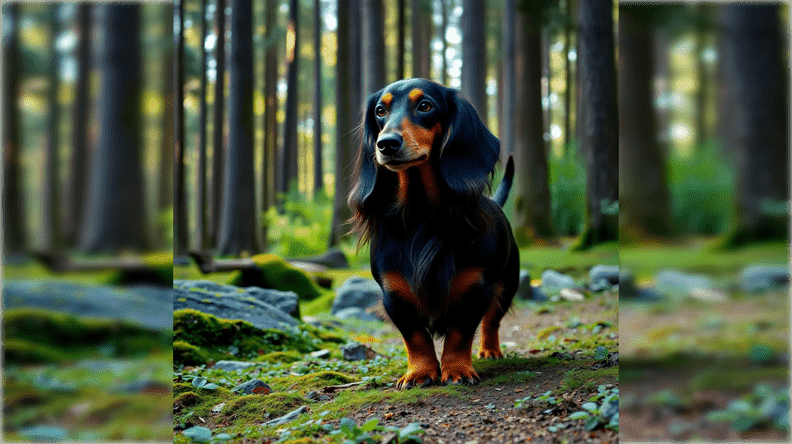
What Size Is a Long Haired Dachshund?
Long-haired dachshunds come in two varieties: the standard and the miniature. The standard variety typically stands between 6-9 inches tall and weighs around 16-35 pounds, while the miniature version is smaller, usually about 5-6 inches tall and weighing only 11 pounds or less. Both varieties maintain the same charming shape and dachshund characteristics but differ in size, making them great companions for a variety of living situations.
What Is a Long-Haired Dachshund’s Coat Type?
The long-haired dachshund has a sleek coat that is naturally wavy, adding to its unique charm. The coat is slightly longer in certain areas, especially around the neck, chest, ears, belly, and back, while the legs are also covered with longer, flowing fur. This long-haired variety of the dachshund stands out with its elegant, slightly fluffy appearance that gives it a soft and graceful look.
What Is a Long-Haired Dachshund’s Temperament?
Long-haired dachshunds are known for their friendlier personalities compared to their wire-haired and smooth-coated counterparts. While some may see them as one-person dogs, they bond closely with their owners and can be quite affectionate. This breed is often more comfortable in a family environment but tends to be less likely to form strong connections with strangers, making them aloof at times, especially with unfamiliar people. With the proper socialization, however, they can be friendly and well-mannered, though they may still be wary of new faces and often bark at strangers.
Despite their small size, long-haired dachshunds are full of personality and possess a courageous and curious nature. Originally bred as badger hunters, they love to dig, often trying to dig up your yard or looking for a designated digging area such as a sandbox. These energetic dogs are always on the move and may get bored without enough exercise or play. If they don’t get enough attention, they might turn to chewing on objects around the home.
See also: Long Haired Chihuahua
Due to their curious nature, long-haired dachshunds need mental and physical stimulation through consistent training and play. With the right balance of exercise and attention, they can be a joy to have as companions. Their fun-loving nature can turn into a mischievous one if not kept engaged, so a well-rounded training schedule is important for a happy, well-behaved doxie.
Are Long-Haired Dachshunds Affectionate?
Long-haired dachshunds are known to be very affectionate, especially with families they trust. While they may prefer not to be left alone for long periods, they enjoy spending time with their owners. These dogs love physical affection, such as petting and cuddling, and are often found sitting on their owner’s lap for extra closeness. Their loving nature makes them great companions for those who enjoy a dog that craves attention and affection.
Are Long-Haired Dachshunds Good With Kids?
Long-haired dachshunds can be good with young children, but it’s important to know their temperament. It is impossible to say that all dachshunds will get along with kids, as some may be more sensitive. If children do not respect the dog’s boundaries, a dachshund might growl or even snap. It is not recommended to allow younger kids to pick them up, as their long backs and fragile bodies might lead to injury if handled incorrectly. However, older children who understand how to properly pick up and interact with a doxie can form a great bond with these dogs. Always make sure they are kept on the floor and allowed to approach the dog on their terms.
Are Long-Haired Dachshunds Good With Other Animals?
Long-haired dachshunds can get along with other dogs and even cats if they have proper socialization and training from a young age. However, because dachshunds were originally bred to hunt, they may have strong hunting instincts, especially around small animals like rabbits or guinea pigs. It’s important to supervise interactions with prey animals and teach them to leave small animals alone. When outdoors, always supervise and keep them on a leash or ensure they stay in the yard, as their instinct to chase things like squirrels or rabbits can lead them to run off. With the right approach, they can be good companions to other animals.

Are Long-Haired Dachshunds Aggressive?
Long-haired dachshunds are generally not aggressive but may show a more ornery side if they feel threatened or uncomfortable. They are known for their sweet and patient nature, but like any dog, they may react with growling or snapping if they haven’t been properly socialized. If treated respectfully and trained from puppyhood, they can be very tolerant and willing to let you do almost anything with them. However, each dog is an individual, so early socialization is key to preventing any problem behaviors.
Do Long-Haired Dachshunds Bark a Lot?
Long-haired dachshunds are quite vocal and are known for their bark. While their bark size may not be as loud as larger dogs, their voice can still be startling. They make excellent watchdogs, often alerted by sounds like animal movements or car brakes squealing. Their tendency to bark can be higher when they sense something out of the ordinary in the yard or around the home. Despite their small size, they have a big personality, which can sometimes make apartment living a challenge if they bark too much.
Are Long-Haired Dachshunds Intelligent?
Long-haired doxies are often considered smart dogs, though they can be stubborn at times. They are curious by nature and have a strong instinct to hunt, which makes them great at following scents. However, they may not always listen during training, especially when off-leash, as they might be more focused on their instincts. Starting training at a young age can help harness their intelligence, making them more responsive and easier to manage. Their sharp mind, combined with their strong will, means they can be trained, but it requires patience.
Are Dachshunds Easy to Train?
Training a long-haired dachshund can be both rewarding and challenging due to their curiosity and intelligence. These dogs are quick to learn new skills, but their stubborn and willful nature can make them a bit picky when it comes to following commands. They can get easily distracted, especially by new sights, sounds, or anything that piques their interest. This means training sessions need to be short and engaging, with minimal distractions to help them focus.
Using reward-based training with treats is highly effective. Offering high-value treats for good behavior can encourage your dachshund to stay focused and motivated. If you’re struggling with distractions, consider having a group class or private trainer to guide you. Some dachshunds may even enjoy showing off their new tricks or taking part in activities like agility training, though care should be taken to protect their long backs from injury.
At a young age, it’s important to begin training early. Puppy classes can help teach your dachshund basic commands and good manners. They can be taught to behave well around people and other animals, which is important for their social development. The key is patience and consistency, as dachshunds can be a bit independent and might prefer to investigate their environment rather than listen to you.
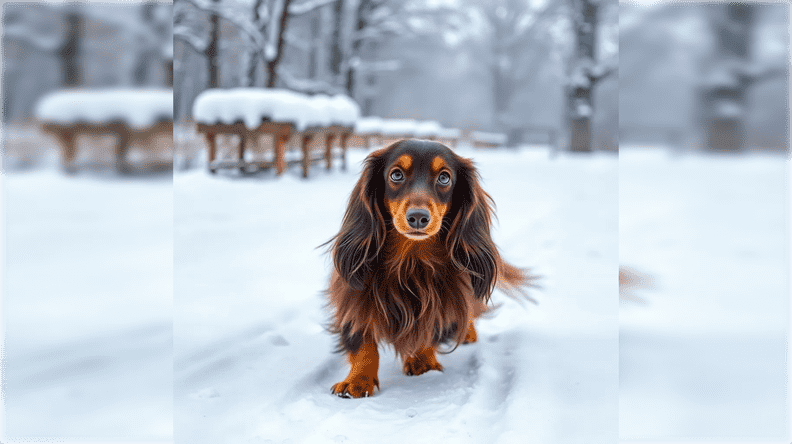
If you’re working on more advanced training or tricks, be prepared for some resistance. Their curiosity can sometimes cause them to wander off in search of something more interesting. With the right techniques, however, a well-trained dachshund can be a well-mannered companion.
Are Long-Haired Dachshunds Energetic?
The long-haired dachshund may be a small hunting breed, but it is surprisingly high-energy and playful. These dogs thrive on daily exercise, such as two 30-minute walks and a good romp in the yard. Activities like a game of fetch are not only fun but also vital for their mental health and physical health. While their size makes them suitable for various environments, they can still handle-less strenuous activities, making them a great companion for active families.
Are Long-Haired Dachshunds Good Apartment Dogs?
The long-haired dachshund is small enough to adapt well to apartments, especially if they get regular daily walks and time at parks to run around and play. However, their propensity to bark can make them a bit ill-suited for quiet settings, as their vocal nature might lead to noise complaints from neighbors. Proper training and attention can help manage this behavior.
Are Long-Haired Dachshunds Good Watchdogs?
The long-haired dachshund may be small in size, but they are fantastic watchdogs because of their alert nature and constant barking when they notice something or someone unusual in the yard or driveway. Their protective instincts make them ideal for safeguarding families, and they are brave enough not to let strangers near without warning. With proper socialization, these dachshunds can learn to distinguish between potential threats and welcomed guests, making them both vigilant and polite.
A key part of raising a well-rounded long-haired dachshund is managing their behavior early to prevent unnecessary barking, which can become excessive. It’s a good thing that these little dogs are naturally wary but require training to understand who to let close. This balance makes them exceptional companions and reliable guardians.
Are Long-Haired Dachshunds Good Service Dogs?
The long-haired dachshund can be a great fit as an emotional support animal (ESA) for individuals seeking comfort and companionship. Their calm and friendly traits, combined with their soft, sleek fur, make them ideal for providing solace to those dealing with mental health challenges. Stroking their fur or having them sit on your lap can offer a calming experience, making them a pleasant choice for people in need of emotional reassurance. Their affectionate personality and love for cuddling create a sense of comfort that few other animals can match.
However, when it comes to being a full-service dog, a long-haired dachshund might be unsuited for tasks that require physical strength or advanced commands. These doxies are known for their strong hunting instincts, which can lead to distractions like chasing scents rather than focusing on their handlers’ needs. While they may struggle to consistently listen to commands in challenging environments, their presence can still benefit their owners, especially in providing emotional stability.
For roles like emotional support animals, their natural ability to offer comfort through their companionship and calming presence shines. Their special training often emphasizes behavior management and ensuring they don’t act on their instincts, like chasing or barking excessively. This adaptability makes them a choice worth considering for people prioritizing mental health benefits over traditional service work.
While not every long-haired dachshund can handle the responsibilities of a service dog, their unique traits make them valuable for owners needing a loving companion. They may not be the perfect solution for all service needs, but their ability to bring joy and comfort through their warm, cuddly nature is undeniable.
How to Care for a Long-Haired Dachshund?
Long-haired dachshunds are a relatively low-maintenance breed, but their long fur does require regular attention to prevent tangling. To keep their coat in top shape, they should be brushed once per week, which helps reduce shedding and maintain their sleek appearance. Occasionally, a visit to a professional groomer can be beneficial for thorough maintenance and trimming. Consistent grooming ensures they remain comfortable and their coat stays healthy.
Do You Need to Groom a Long-Haired Dachshund?
Yes, long-haired dachshunds require regular grooming to keep their long fur healthy and free from matting. Their dachshund’s coat, much like a Yorkie’s, benefits from consistent brushing to maintain its sleek appearance. Special attention should be given to the stomach area, as these dogs are low to the ground and often get debris caught in their fur during a romp outside. Trimming the belly shorter can help reduce this issue.
Grooming isn’t just about their coat; long-haired dachshunds also need regular care for their nails and teeth. Nails should be trimmed to prevent discomfort while brushing daily keeps their teeth and gums in good shape. A visit to a professional groomer can be helpful for thorough grooming and coat care, ensuring these dogs look and feel their best.
Do Long-Haired Dachshunds Shed?
Yes, long-haired dachshunds do shed, but they do so moderately throughout the year round. Unlike heavy shedders like Labradors or huskies, their hair is less likely to cover your furniture or clothes profusely. Regular brushing helps manage shedding and keeps their coat healthy and tangle-free.
What Should a Long-Haired Dachshund Eat?
A long-haired dachshund needs a balanced dog food designed for smaller breeds to meet their unique calorie and nutritional needs. Look for options labeled as the best dog foods that comply with AAFCO guidelines and have undergone feeding trials to ensure quality. Always follow the feeding guidelines provided on the package, adjusting portions based on activity level and weight.
Dachshund owners should be careful about overfeeding because extra weight can lead to serious health issues like obesity, which stresses their long backs and increases the risk of herniated discs. Keeping their calorie intake in check is vital, and even treats or handouts should be part of their overall diet to avoid adding extra calories unknowingly.
Using online calculators or doing some math to assess daily calorie needs can help. The numbers from the bag of dog food serve as a guide but may need adjusting for factors like activity level. Overindulgence in treats is a common mistake, so all extras must be properly factored into their diet plan.
Consulting veterinary nutritionists ensures a tailored approach for your dachshund’s needs. By carefully managing their meals and treats, you can prevent weight gain and keep your pet healthy and active.
What Health Problems Do Long-Haired Dachshunds Have?
A long-haired dachshund is often predisposed to certain health issues due to their long backs, making them vulnerable to intervertebral disc disease (IVDD). This condition affects the spine and disc, potentially compressing the spinal cord and causing symptoms like back pain, mobility challenges, and even lameness in the back legs. Dachshund owners should be aware of signs such as painful movement and consult a vet promptly. Treatment options may include medication, physical therapy, or even surgery for severe cases.
To prevent such problems, it’s essential to avoid activities that could injure their back, such as jumping off furniture. Keeping them at a healthy weight is also critical, as obesity adds strain to their spine and increases the risk of IVDD. Regular exercise tailored to their needs can help maintain their fitness while protecting their back.
Besides back-related issues, dachshunds may face other health issues like heart disease, hypothyroidism, and eye disorders. Responsible breeding practices play a big role in reducing these risks. Always choose a breeder who performs health testing on parent dogs to ensure good health in their offspring.
By staying informed and proactive, dachshund owners can better support their pets’ well-being. Early detection and prevention go a long way in managing the unique challenges of this charming breed.
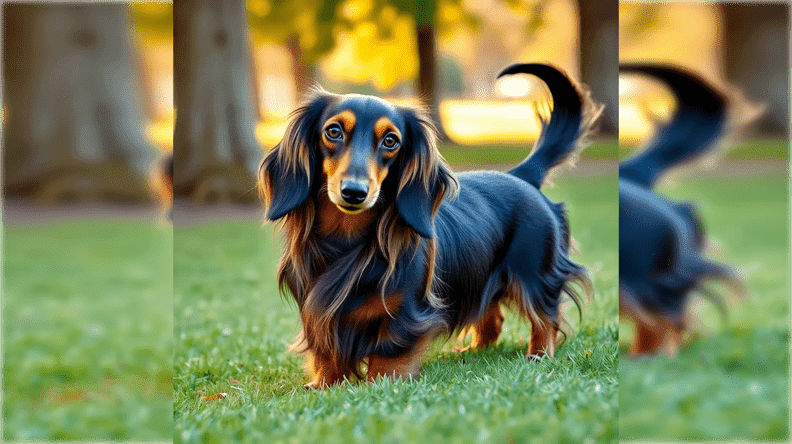
How Long Do Long-Haired Dachshunds Live?
On average, long-haired dachshunds have a lifespan of 12 to 16 years.
Are Long-Haired Dachshunds Expensive?
The price of a long-haired dachshund can vary greatly, typically ranging from $1000 to $3500. This wide price range depends on factors such as the breeder’s credentials, whether the dog comes from a pedigree background, and if it has potential as a show dog. AKC-registered puppies, especially those with a Best in Show title or those from champions, are usually more expensive. However, if you’re willing to adopt from a shelter, you may find a more affordable option. Adoption fees are usually much lower and adopting can be a great way to give a dog a loving home.
It’s important to consider that the cost of owning a long-haired dachshund doesn’t end with the initial price. There are ongoing expenses, including vet bills for routine care, vaccinations, and potential treatments for health issues like IVDD, which are common in dachshunds due to their long backs. Other costs include grooming to maintain their coat colors and the care needed for any health problems. Over time, these expenses can add up, so it’s important to budget for the care of your pet.
Whether you choose a puppy from a breeder or a dog from a shelter, always consider the long-term care involved in owning a dachshund. The health of the dog and the potential for health issues like IVDD should be factored into the overall cost. If you’re looking for a long-haired dachshund as a companion, it’s important to be prepared for both the initial and ongoing expenses.
How to Find a Long-Haired Dachshund Breeder?
Finding a reputable long-haired dachshund breeder requires research and careful consideration. Start by using online platforms like Google, Petfinder, and AKC’s Puppy Finder to locate breeders. Look for breeders with proper credentials and a good reputation. It’s essential to ensure that the breeders conduct health testing on their parent animals to check for genetic conditions. The health history of the dogs should be transparent, and the breeder should be willing to share details about vaccinations, shots, and any past health issues.
Ask the breeder about the living conditions of the dogs and how the puppies are raised. A responsible breeder ensures the puppies are well-socialized and treated with care. The temperaments of both the parents and puppies are crucial, as they will influence the dog’s behavior later in life. Additionally, a good breeder provides a health guarantee in the form of a contract to give peace of mind in case of a serious illness. Be cautious of breeders who seem irresponsible or fail to provide health records and guarantees.
If you’re not getting a puppy from a breeder, consider working with adoption agencies that specialize in dachshunds. Some breeders or agencies may also offer reimbursement if the dog develops a serious illness soon after adoption. Make sure you find a home where the dog will be kept for life and treated well, ensuring it has a safe and loving environment. It’s vital to choose a breeder or facility that has experience and treats its animals with the respect they deserve.
Can You Adopt a Long-Haired Dachshund?
Yes, you can adopt a long-haired dachshund through various rescues and shelters. Organizations like Midwest Dachshund Rescue and Dachshund Rescue of North America focus on rescuing and rehoming dachshunds in need. To start your search, use Google to find dachshund rescues near me or check your local shelters for available dogs. Many rescues offer resources to help you understand the breed and ensure you’re ready for a new pet.
Adopting a long-haired dachshund gives you the chance to provide a loving home to a dog in need. These rescues usually have detailed profiles of each dog, including their health, temperament, and any special needs. If you’re looking for a specific breed, such as a long-haired dachshund, these rescues are often the best places to find them.
Are Long-Haired Dachshunds Purebred?
Long-haired dachshunds can be purebred if both parents are of the same breed and meet the breed standard. The American Kennel Club (AKC) recognizes long-haired dachshunds as part of the dachshund breed, with a distinctive long-haired coat. However, to be considered purebred, both parents must have long-haired coats and exhibit the appropriate temperament for the breed.
If you’re looking for a purebred long-haired dachshund, it’s important to ensure that both parents are also long-haired dachshunds. Two long-haired parents increase the likelihood that the puppies will have the same sleek coat and desirable characteristics of the breed. Always check the breeder’s information and ensure the dogs have proper AKC credentials.
Can You Show Long-Haired Dachshunds?
Yes, long-haired dachshunds can be shown at dog shows, as long as they meet the breed standard. For example, their coat colors should align with acceptable shades like fawn or black. If a long-haired dachshund has any faults or does not match the standard, they might be disqualified. When looking for a puppy for show purposes, it’s essential to find a reputable breeder who breeds show dogs that are likely to meet the required specifications for the competition.
Are Long-Haired Dachshunds Good for New Dog Owners?
Long-haired dachshunds can be a good choice for inexperienced dog owners, but they come with a few challenges. Dachshunds are known to be stubborn and willful, which can make training a bit tricky, especially for someone who has never owned a dog before. New owners need to do their research on dog behavior and be prepared to work with a professional dog trainer if needed. With patience and commitment, even inexperienced dog owners can successfully raise a long-haired dachshund.
Is a Long-Haired Dachshund the Right Dog for Me?
A long-haired dachshund can be a lovely companion for many owners, especially if you’re looking for a dog with a big personality. These dogs are playful, and energetic, and enjoy cuddling with their owners, forming strong bonds. However, they can also be yappy and vocal, which might not make them the best fit for people in apartments or those who prefer a quiet environment. Dachshunds are known for being stubborn and willful, so if you’re an inexperienced owner, they may present a challenge in terms of dog training. Having a confident leader who can handle their training with a professional dog trainer can make the process easier.
While long-haired dachshunds are wonderful family dogs, they may not be the best choice for homes with young children or small pets like rabbits or guinea pigs, as they have a strong hunting instinct. Their coat care can also be demanding, requiring regular trimming to avoid debris and tangles. If you’re looking for a dog with a strong bond to its owner, who can be obedient when trained well, a long-haired dachshund could be a joy to own. However, they are not always easy to train and may not always be in the mood for cuddles, which requires patience.

